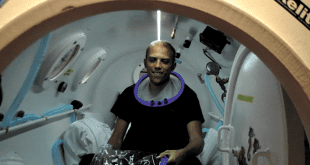By Jonathan Waxman, MD
Lung cancer accounts for 27 percent of all cancer deaths each year in the U.S., making it the deadliest cancer among both men and women. In fact, 1 in 15 Americans will be diagnosed with the disease. Sadly, lung cancer also has the lowest five-year survival rate, with fewer than 2 out of 10 people diagnosed with the disease living five years or more. However, with education and advanced diagnostics, more people are being diagnosed early, which leads to better treatment outcomes and survival rates.
Lung cancer is the uncontrolled growth of abnormal cells in the lung. These cells grow rapidly and do not function as lung cells do normally. They form tumors that interfere with the lungs’ ability to transfer oxygen and carbon dioxide.
Lung cancer can affect one or both lungs and most often occurs in the cells that line the tubes that carry air into and out of the lungs. There are two main types of lung cancer: small cell and non-small cell.
We caught up with cardiothoracic surgeon Dr. Jonathan Waxman to discuss more facts and important information on lung cancer screenings. Dr. Waxman is involved in all aspects of lung cancer, from diagnostics to treatment.
Q: WHO IS THE HIGHEST-RISK PATIENT POPULATION FOR LUNG CANCER?
A: First and foremost, active or former smokers are at the highest risk, as are patients with a family history of lung cancer. Lung cancer is the second most prominent cancer in men and women after prostate and breast cancer. It’s the number one cancer-related death in both men and women.
Q: WHAT CAUSES LUNG CANCER FOR PEOPLE WHO HAVE NEVER SMOKED?
A: Lung cancer can be caused by genetics, family history, exposure to toxic chemicals, secondhand smoke, and sometimes other cancers can trigger lung cancer.
Q: HOW COMMON IS LUNG CANCER?
A: Lung cancer is the second most common cancer in both men and women.
Q: WHAT ARE THE LUNG CANCER SCREENING CRITERIA? WHO IS ELIGIBLE?
• 50-80 years old and in fairly good health
• 20 pack-year smoking history. Calculated by packs per day times number of years smoked
• Smokers who have quit in the past 15 years
Q: WHAT ARE THE BENEFITS OF LOW-DOSE CT SCANS FOR LUNG CANCER SCREENINGS?
A: They allow us to identify early-stage lung cancer, so we can treat it before they become advanced. It’s painless, has no injections, and takes just a few minutes. It’s less radiation than a regular scan. It’s also a yearly test – not just once.
Low-dose CT scans are the best for lung cancer screening and early diagnosis. Over a decade ago, it was common to use a chest X-ray to diagnose lung cancer, but low-dose CT scans are readily available to detect very minimal and small tumors early, which gives patients a better treatment outcome.
When we discuss this procedure with our patients, we consult with them during a shared decision-making process explaining the pros and cons of the screening. For those at high risk, this scan is essential.
Low-dose CT scans are a straightforward technique for patients. It only takes less than 5 minutes. It’s non-invasive and offers the opportunity to identify lung cancer at an earlier stage.
Because we can catch these cancers early, meaningful treatments are implemented. Lung cancer can be lethal when caught in later stages.
Insurance will usually cover the screening if they fit the criteria.
Smoking cessation is critical to try to change the incidence of lung cancer. Patients should consult with their healthcare provider to find ways to quit immediately.
Q: WHAT DO YOU WANT PATIENTS TO KNOW ABOUT LUNG CANCER AND SCREENINGS?
A: I would emphasize that lung cancer screening saves lives.
If you or your loved ones smoke currently or have in the past, inquire with their healthcare provider to find out if they qualify for a low-dose screening scan – it may help save your life.
Treatment & Recovery
Depending on the stage and type of lung cancer, there are several treatment options. These include surgery, chemotherapy, radiation therapy, targeted drug therapy, and immunotherapy. Early detection is imperative for survival rates, health impacts, and recovery.
Jonathan Waxman, MD
Dr. Jonathan Waxman is board certified in general surgery and thoracic surgery. He earned his Doctor of Medicine from Universida Anahuac in Mexico City, Mexico. He continued his medical education by completing a surgery internship and residency at Harvard Medical School, Beth Israel Deaconess Medical Center in Boston, Massachusetts. He then completed a cardiothoracic surgery fellowship at the University of Tennessee in Memphis, Tennessee, and then a minimally invasive surgery fellowship at the University of Pittsburgh Medical Center in Pittsburgh, Pennsylvania. Dr. Waxman strives to provide state-of-the-art thoracic oncology care in a comprehensive manner, ensuring good communication with all the physicians involved in the care of his patients. His clinical interests include minimally invasive thoracic/foregut surgery and robotic and video-assisted surgery. He is a member of the Society of Thoracic Surgeons, the American College of Chest Physicians, the General Thoracic Club, the Society of American Gastrointestinal and Endoscopic Surgeons, and is a fellow of the American College of Surgeons. He speaks fluent Spanish and Hebrew. Dr. Waxman is affiliated with St. Joseph’s Hospital.
BayCare Medical Group Thoracic Surgery
3003 W Dr. Martin Luther King Jr Blvd Fl 2
Tampa, FL 33607
Don’t wait; schedule your lung cancer screening today.
(813) 238-0810
 Central Florida Health and Wellness Magazine Health and Wellness Articles of the Villages
Central Florida Health and Wellness Magazine Health and Wellness Articles of the Villages


